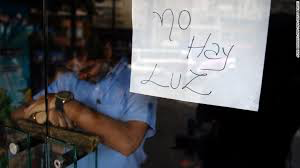|
Charges Fly as Venezuela Blackout Continues
March 10, 2019
Venezuelan opposition leader Juan Guaido issued a call for a large protest in Caracas, as millions of people went without electrical power for a fourth day. President Nicolas Maduro blamed cyberattacks for the blackout. Guaido, who recently returned to the country after visiting a few other South American countries to drum up support, stood atop a bridge in the capital while making his speech. He did not specify a date, time, or place for the protest. He did summon a special meeting of the National Assembly, of which he is the leader, for Monday; Guaido said that the planned to declare a national emergency. A scuffle between protesters and security forces preceded Guaido's speech. No one was injured. Elsewhere in the city, a march organized by the ruling Socialist Party called for support for President Nicolas Maduro, who blamed saboteurs foreign and domestic for the electrical power outages, which began with a large power cut at one of the country's largest power plants. Also a target of that march's ire were new oil sanctions announced recently by the U.S. The head of the international organization Doctors for Health said that 17 people had died so far in the blackout and that nine of those died in emergency rooms. Elsewhere, nurses were monitoring the vital signs of expectant mothers by hand and by candlelight, after backup generators at the hospital failed. Among the effects of the blackout, which at two days was already the country's longest:
The power outage began about 5 p.m. on March 7. The power was on again briefly the following day but went out again. Some parts of Caracas have power again. All but one of the country's 23 states are still in the dark. Guaido in January invoked an obscure part of the country's constitution to declare himself president, asserting that Maduro's re-election was illegitimate. A few dozen other countries, notably the U.K. and the U.S., have recognized Guaido as the official leader of the country. A handful of other countries, notably China and Russia, have reasserted their support for Maduro. Guaido has won the support of 50 other national leaders, including American President Trump and U.K. Prime Minister Theresa May, and has said that he will begin to take action as if he were his country's leader. High-ranking members of several countries that have issued that support were at the airport to greet Guaido. On the ground in Venezuela, however, Maduro still controls the army and most of the mechanisms of political power. Some high-profile army officers have left their posts, intending to support Guaido and the opposition; most, however, remain in the large armed force that still takes orders from Maduro. On the political front, Maduro's party controls the super-parliamentary body the National Constituent Assembly, which was created in 2017 after the opposition gained control of what used to be the nation's top lawmaking body, the National Assembly, which Guaido heads. The country, which has been in the grips of an economic crisis for a few years now, is set to face further sanctions, imposed by the U.S., which is also urging other countries to stop trading with Venezuela as long as Maduro is in power. In early February, the army responded to the arrival of a shipment of humanitarian aid from the U.S. by setting fire to the trucks containing the aid. The self-proclaimed heir to popular strongman Hugo Chavez, Maduro was re-elected to a second six-year term in late 2018, in an election boycotted by many opposition parties. |
Social Studies for Kids |
Social Studies for Kids
copyright 2002–2024
David White







